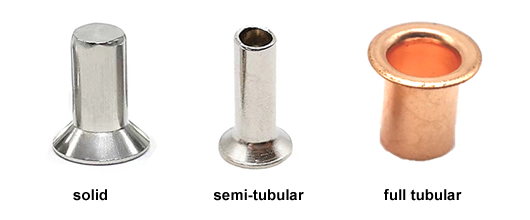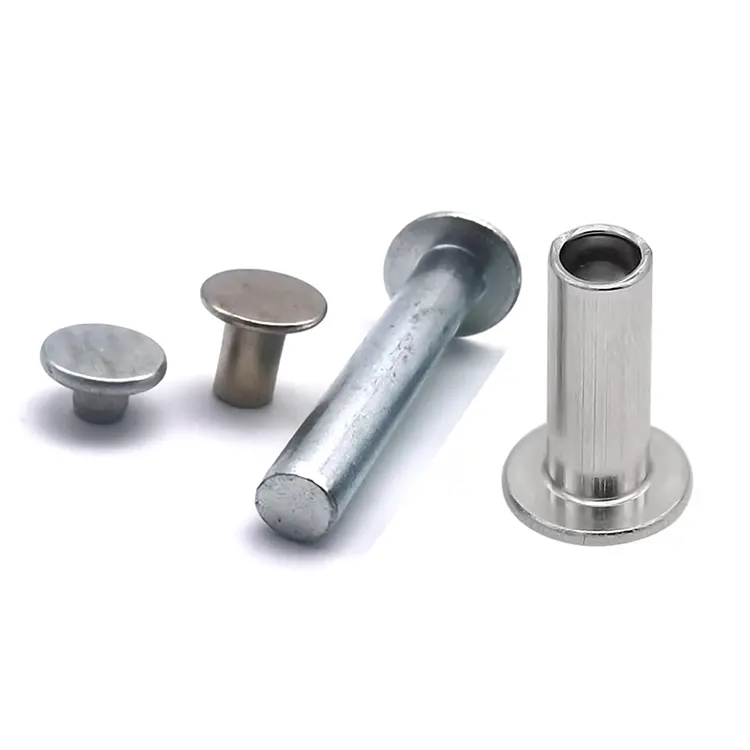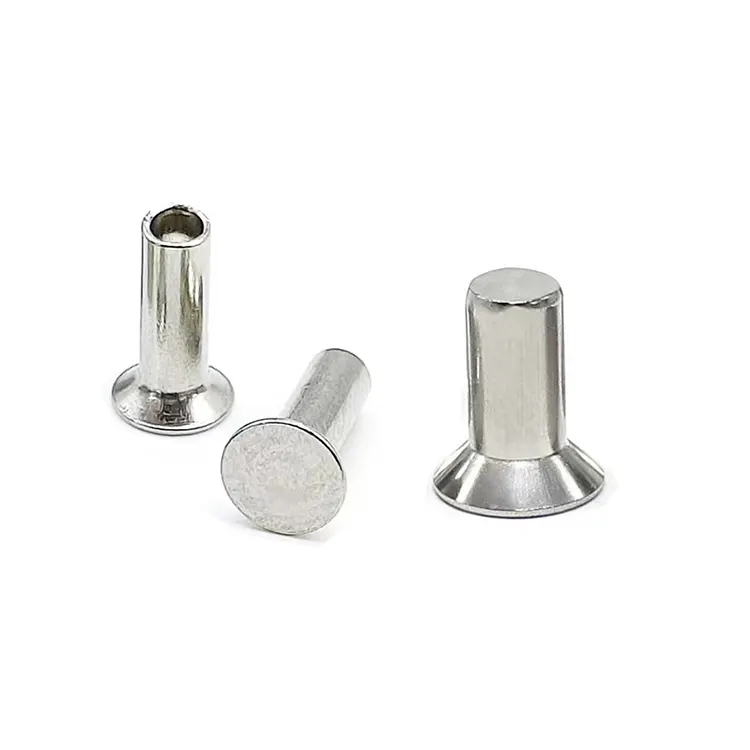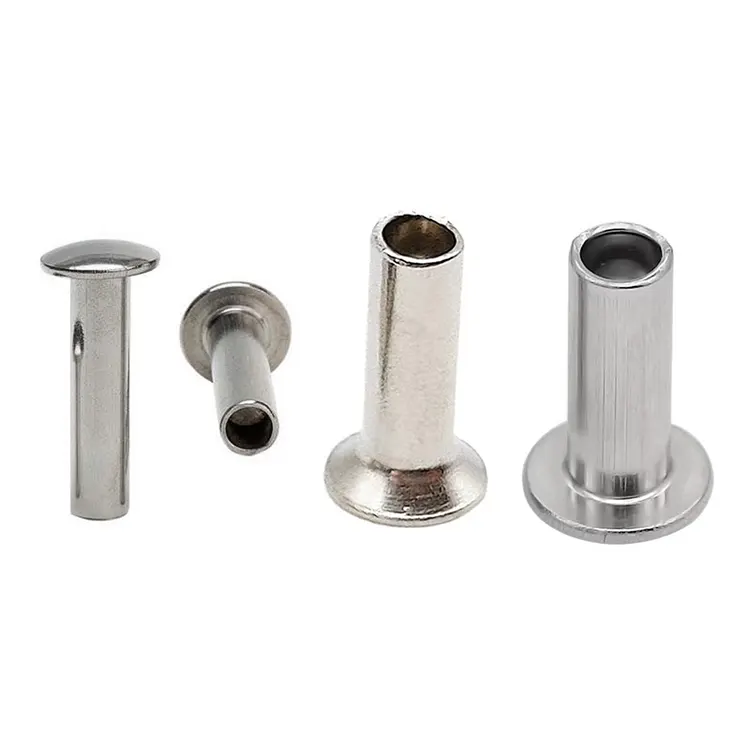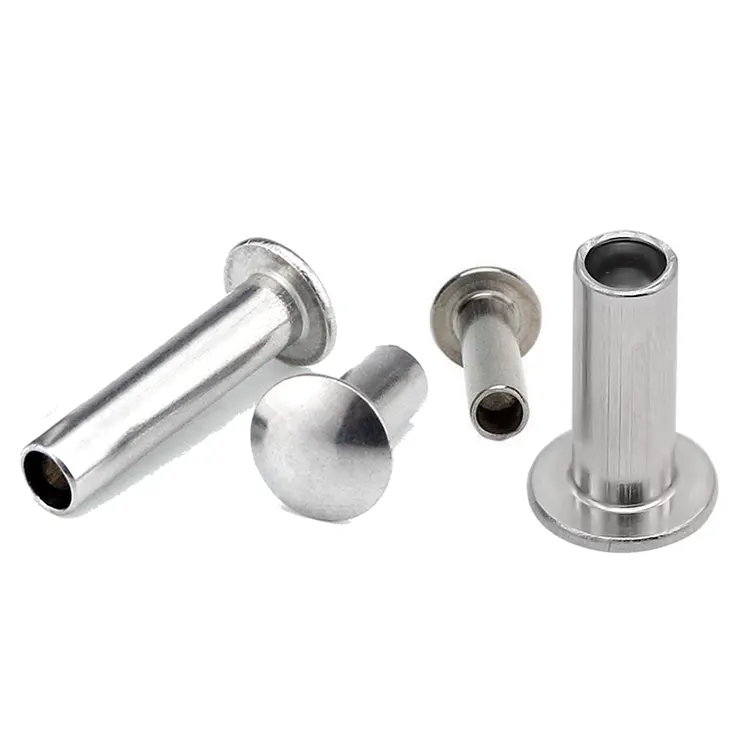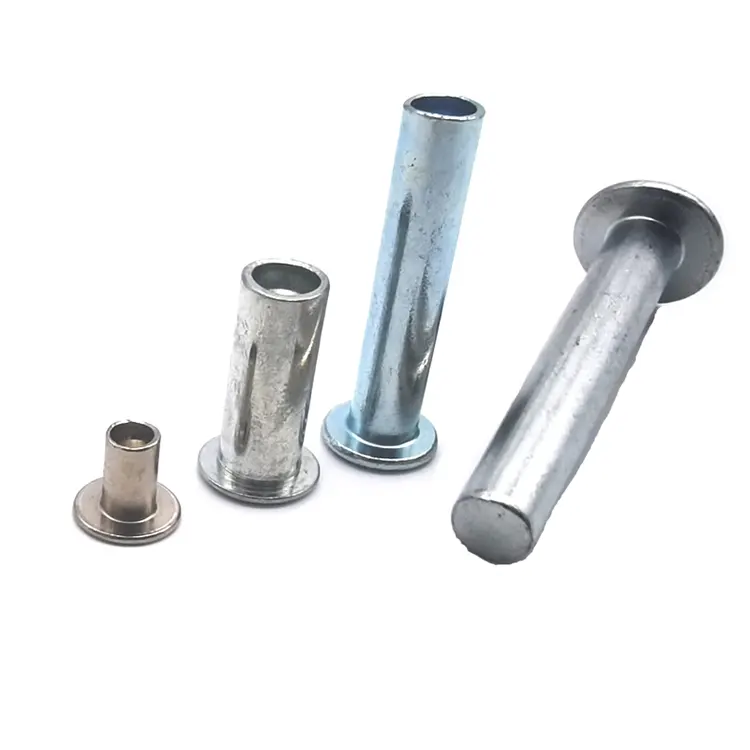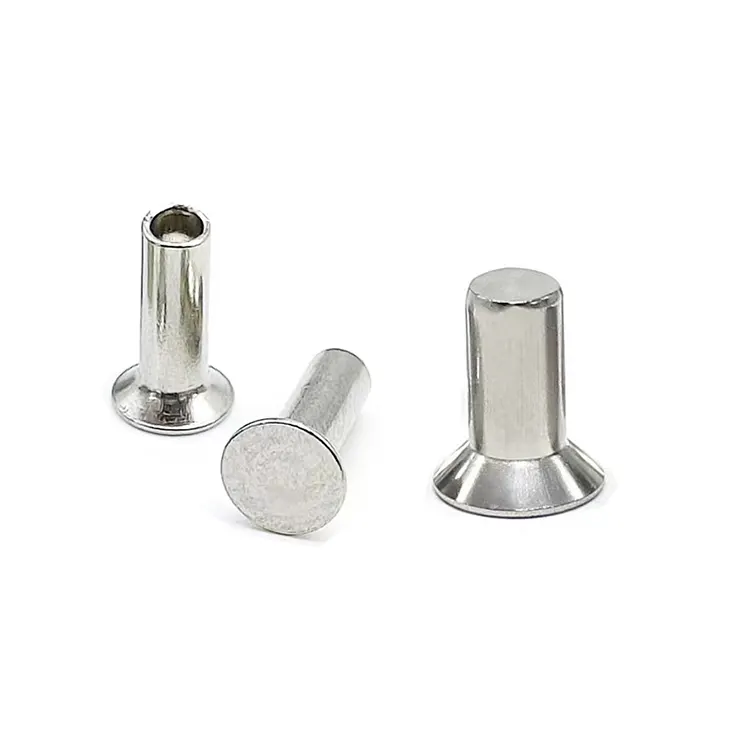Đinh tán
As one of professional manufacturer in China, Notin would like to provide you Rivets. And we will offer you the best after-sale service and timely delivery.
What is a rivet?
A rivet is a permanent mechanical fastener used to join two or more materials. Rivets work by inserting a metal pin into an aligned hole and deforming the end, creating a strong, secure, and durable connection. Unlike temporary fasteners like screws, rivets do not rely on threads, but instead form a permanent connection, making them ideal for applications requiring high strength, durability, and vibration resistance.
Classification of Rivets
Rivets are typically categorized by head shape, degree of hollowness, or material.
Based on head shape, rivets can be classified as flat head rivets, round head rivets, countersunk head rivets, mushroom head rivets, universal head rivets, truss head rivets, etc.

Based on degree of hollowness, rivets can be classified as solid rivets, semi-tubular rivets, or full tubular rivets.
Based on material, rivets can be classified as brass rivets, stainless steel rivets, steel rivets, aluminum rivets, copper rivets, etc.
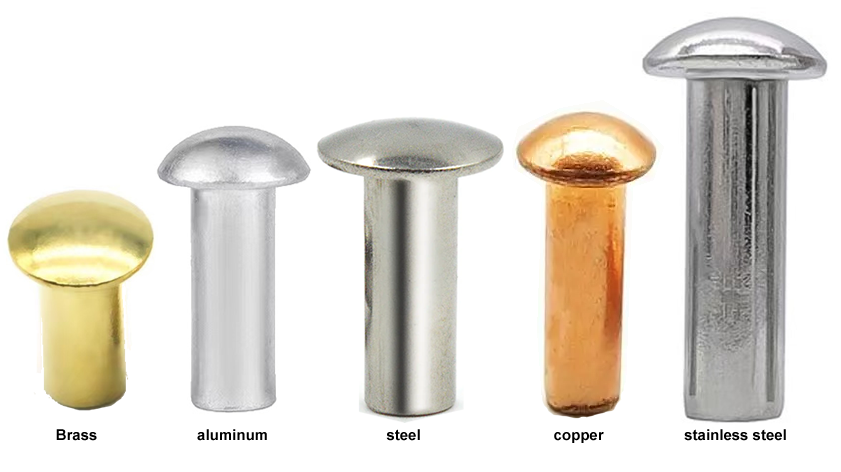
What surface finishes are available for rivets?
Rivet surfaces are typically treated with rust-proofing treatments, primarily electroplating, including zinc plating, nickel plating, chrome plating, tin plating, gold plating, and silver plating. Electroplating is a common rust-proofing method for rivets. It applies a layer of plating to the rivet surface through physical or chemical methods. The plating effectively prevents corrosion and rust, while also providing a certain aesthetic effect.
Another special surface treatment method is head coating. Head coating is performed after the rivet is electroplated. This allows for a variety of colors on the rivet head, achieving an aesthetically pleasing finish.
Aluminum rivets cannot be electroplated, but they can be anodized. Anodizing also allows for a variety of color options, but the unit price is higher than electroplating.
Rust-proofing the rivet surface is crucial, effectively extending the rivet's service life and ensuring a secure connection. Different rust-proofing methods are suitable for different environments and applications, so the choice should be tailored to the specific situation.
- View as
Đinh tán đầu sắt phẳng
Là một đầu nối cơ khí thông thường, đinh tán đầu phẳng bằng sắt chiếm một vị trí quan trọng trong nhiều lĩnh vực công nghiệp do đặc điểm thiết kế và phạm vi ứng dụng rộng rãi. Về mặt cấu trúc, đầu đinh tán phẳng, hình đĩa và thân hình trụ. Phần cuối được xử lý đặc biệt để tạo thành một cấu trúc khó chịu. Sau khi lắp đặt, áp lực hoặc tác động làm cho phần thân nở ra, tạo thành sự ăn khớp cơ học với thành lỗ để đạt được hiệu quả siết chặt. So với đinh tán đầu tròn hoặc đinh tán đầu chìm, thiết kế đầu phẳng có lợi thế đáng kể về phân bố lực và diện tích tiếp xúc. Ví dụ, khi chịu lực cắt, đầu hình đĩa của nó có thể phân tán tải trọng đến một diện tích lớn hơn, giảm áp suất trên một đơn vị diện tích một cách hiệu quả.
Đọc thêmGửi yêu cầuĐinh tán đầu chìm bằng sắt
Đầu của đinh tán đầu chìm bằng sắt có hình dạng giống như một hình nón cụt, với hình nón thường nghiêng một góc 90° hoặc 120° so với trục của đinh tán. Hình dạng này cho phép đầu đinh tán nằm ngang bằng với bề mặt của bộ phận được kết nối sau khi lắp đặt, mang lại vẻ ngoài mịn màng. Điều này đặc biệt thích hợp cho các ứng dụng mà độ phẳng bề mặt là rất quan trọng. Hãy đến với Nuote Metals để tùy chỉnh chiếc đinh tán đầu chìm bằng sắt mà bạn mong muốn. Các kỹ sư của chúng tôi, với hơn 10 năm kinh nghiệm, rất quen thuộc với việc sản xuất các loại đinh tán khác nhau.
Đọc thêmGửi yêu cầuĐinh tán nửa hình ống
Đinh tán nửa hình ống là một dây buộc kim loại rắn ở một đầu và một phần rỗng ở đầu kia, thường được làm bằng vật liệu như hợp kim nhôm, đồng hoặc thép. Phần rỗng chiếm khoảng một phần ba đến một nửa chiều dài của thân đinh tán. Thiết kế này cho phép đinh tán đạt được hiệu quả buộc chặt thông qua biến dạng đùn trong quá trình lắp đặt. So vớiđinh tán rắn, đinh tán nửa hình ống được đặc trưng bởi trọng lượng nhẹ, lắp đặt dễ dàng và khả năng ứng dụng rộng rãi; so với đinh tán rỗng hoàn toàn, chúng mang lại độ bền và độ ổn định cao hơn. Đinh tán dạng nửa ống không yêu cầu thiết bị phức tạp trong quá trình lắp đặt và thường có thể được hoàn thiện bằng các dụng cụ thủ công hoặc khí nén. Vì vậy, chúng được ưa chuộng trong nhiều lĩnh vực. Nuote Metals chuyên sản xuất đinh tán nửa hình ống, với đầy đủ các loại khuôn mẫu và hoan nghênh việc tùy chỉnh.
Đọc thêmGửi yêu cầuĐinh tán nửa rỗng
Nuote Metals nằm ở Đông Quan, Trung Quốc, chúng tôi chuyên sản xuất nhiều loại đinh tán, bao gồmđinh tán rắn, đinh tán hình bán nguyệt, Vàđinh tán hình ống đầy đủ. Đinh tán nửa rỗng là loại dây buộc công nghiệp phổ biến, có cấu trúc lõi rỗng với đầu và thân nửa kín. Thiết kế này cho phép chúng kết hợp giữa trọng lượng nhẹ và độ bền cao, khiến chúng được sử dụng rộng rãi trong các ứng dụng yêu cầu tán đinh hiệu quả. So với đinh tán đặc, đinh tán nửa rỗng giảm trọng lượng bằng cách sử dụng ít vật liệu hơn, đồng thời tận dụng biến dạng dẻo trong quá trình tán đinh để đạt được kết nối an toàn, khiến chúng đặc biệt phù hợp với các ứng dụng nhạy cảm với trọng lượng.
Đọc thêmGửi yêu cầuĐinh tán đầu phẳng
Nuote Metals chuyên sản xuất đinh tán, sản xuất nhiều loại vật liệu như thép không gỉ, đồng thau, nhôm, thép carbon và đồng. Đinh tán là một loại dây buộc phổ biến được sử dụng trong các cấu trúc và cụm lắp ráp khác nhau trong cả sản xuất công nghiệp và cuộc sống hàng ngày. Đinh tán đầu phẳng là sản phẩm được nhiều ngành công nghiệp lựa chọn do hiệu suất và khả năng thích ứng độc đáo của chúng.
Đọc thêmGửi yêu cầuĐinh tán đầu chìm
Đinh tán chìm là một loại dây buộc cơ học phổ biến, chủ yếu được sử dụng cho các ứng dụng buộc chặt đòi hỏi độ bền cao và bề mặt nhẵn. Thiết kế đầu chìm của chúng cho phép chúng nằm ngang bằng với bề mặt phôi sau khi lắp đặt, loại bỏ bất kỳ phần nhô ra nào có thể ảnh hưởng đến hình thức hoặc chức năng. Mặt khác, đinh tán rắn chìm được chế tạo từ một mảnh vật liệu rắn duy nhất, không có bất kỳ phần rỗng nào. Chúng thường được sử dụng để kết nối các phôi một cách chuyên nghiệp bằng cách đóng búa hoặc tán đinh. Ngoài ra còn có một đinh tán hình bán nguyệt có đầu chìm, với một phần rỗng ở đầu để tán đinh dễ dàng hơn và ít tốn công hơn so với đinh tán đặc.
Đọc thêmGửi yêu cầuWhat are the advantages of rivets over other fasteners?
1. Ease of Installation
Rivets are fast to install, and even fully automated for high-volume applications, resulting in a simple and efficient operation process.
2. Connection Reliability
The riveting process is standardized, with strict quality control, resulting in highly stable connections. Visual inspection allows for quick verification of connection quality.
3. Vibration and Impact Resistance
Rivets connect through deformation or interference fit, providing strong clamping force and excellent vibration resistance, capable of withstanding vibration and shock.
4. Low Cost
Rivets are easy to install and can be fully automated, saving significant labor costs.
What are the advantages and disadvantages of rivets made of different materials?
Aluminum Rivets
Advantages: Lightweight, reduces overall product weight, low cost, suitable for general civilian applications.
Disadvantages: Low tensile and shear strength, unsuitable for high-strength workpieces, prone to electrochemical corrosion when in contact with metals such as stainless steel.
Stainless Steel Rivets
Advantages: Strong corrosion resistance, high hardness, suitable for high-strength workpieces (such as marine equipment)
Disadvantages: Higher cost, typically more expensive than aluminum rivets of the same specification.
Brass and Copper Rivets
Advantages: Excellent conductivity (such as connecting electronic components), good corrosion resistance.
Disadvantages: Higher cost, more difficult to process.
Steel Rivets
Advantages: High hardness, high connection reliability, and wide applicability.
Disadvantages: Compared to other materials, iron rivets are more prone to rusting.
What are the main applications of rivets?
Rivets have a wide range of uses, from small items like a pair of scissors to large items like airplanes and ships, as well as in high-precision medical applications.
Industrial Manufacturing
Rivets are used in a wide variety of industrial fields, wherever there is a need to connect two or more materials.
Electronics
Rivets secure heat sinks and chips, providing both vibration damping and noise reduction, and are widely used in the cooling systems of electronic products such as computers and mobile phones.
Automotive
Rivets are widely used to connect components of automobile bodies and chassis, such as doors and hoods. Their lightweight and corrosion-resistant properties make them an indispensable joining method in automotive manufacturing.
Aerospace
In aircraft manufacturing, rivets are used to connect different fuselage components, such as wings and tailplanes. Millions of rivets create high-strength, corrosion-resistant joints. Aluminum and titanium alloy rivets are often used to connect components of corresponding materials, ensuring stability in extreme environments.
Rivets are used everywhere. The above examples only represent a small number of their applications. We see rivets everywhere in our daily lives, such as on scissors, folding beds, and strollers etc. Rivets can be customized to different sizes and materials depending on the application.
Nuote Metals has specialized in the rivet industry for over a decade. Our factory is located in Dongguan, a city known as the "World Factory," a city with a developed industry and convenient transportation. This allows us to respond quickly when acquiring raw materials and supporting surface treatments, meeting our customers' needs for quick access to samples and bulk orders. We produce 10 million rivets daily and have molds of various specifications, allowing us to produce rivets as small as 0.8mm and as large as 10mm. We welcome your inquiries and visits.






